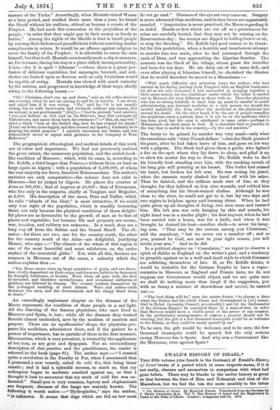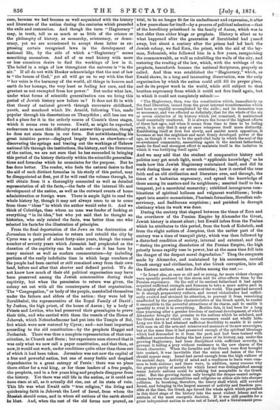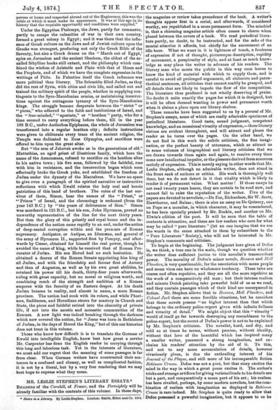EWALD'S HISTORY OF ISRAEL.*
Tam fifth volume (the fourth in the German) of Ewald's History of Israel treats of a period which in some respects seems, if it is not really, obscure and anomalous in comparison with what had gone before. There may be blanks in the earlier history as great as that between the time of Ezra and Nehemiah and that of the Maccabees, but we feel the loss the more sensibly in the latter • The History of Israel. By Heinrich Ewald. Translated from tbe.German by J. Munn Carpenter, MA. Vol. V. Tbe History of Israel and the Haxiocracy in Israel to the Time of Christ. London: Longmans and Co. 1874. case, because we had become so well acquainted with the history and literature of the nation during the centuries which preceded the exile and restoration. And though the term " Hagiocracy " may, in truth, tell us as much or as little of the science or the philosophy of history, as monarchy, aristocracy, or demo- cracy, yet we are accustomed to accept these latter as ex- pressing certain recognised laws in the development of national life, by the side of which a "Hagiocracy" seems something anomalous. And all of us read history with more -or less conscious desire to find the workings of law in it. The belief in a reign of law throughout the universe is "in the air." If all do not withilooker acknowledge that the seat of law is "the bosom of God," yet all will go on to say with him that "her voice is the harmony of the world, all things in heaven and earth do her homage, the very least as feeling her care, and the greatest as not exempted from her power." But under what law, under what forms of scientific generalisation can we bring this period of Jewish history now before us ? It does not fit in with that theory of national growth through successive childhood, youth, and manhood which Dr. Arnold, following Vico, made popular through his dissertations on Thucydides ; still less can we find a place for it in the orderly course of Comte's three stages, which it seems even to reverse. Ewald, as might be expected, endeavours to meet this difficulty and answer this question, though he does not state them in our form. Bat notwithstanding his great intuitive power—displayed largely here, as elsewhere—of discovering the springs and tracing out the workings of Hebrew national life through the institutions, the history, and the literature of the nation, we are not sure that he has succeeded in bringing this period of the history distinctly within the scientific generalisa- tions and formulas which he enunciates for the purpose. But he bas done better. The reader, who feels the natural desire to find the aid of such distinct formulas in his study of this period, may be disappointed at first, yet if be will read the volume through, he will obtain from it a thoroughly connected as well as detailed representation of all the facts,—the facts of the internal life and development of the nation, as well as the outward events of home administration or foreign wars. There is ample light to read the -whole history by, though it may not always seem to us to come from those " ideas " to which the author would refer it. And we think of Coleridge, than whom no man was fonder of looking at everything "in its idea," but who yet said that he thought an historian, who only related the facts, was better than one who selected his facts for the illustration of principles.
From the final deportation of the Jews on the destruction of Jerusalem to their permission to return and rebuild the city by Cyrus was a period of about forty-nine years, though the round number of seventy years which Jeremiah had prophesied as the duration of the captivity can be made out—as it has been by many ancient as well as modern commentators—by including portions of the really indefinite time in which large numbers of the people had been carried or still remained away from their own land, before and after that shorter and defined period. We do not know how much of their old political organisation may have been preserved among the Jewish communities during their captivity, but when the permission to return was given, the colony set out with all the counterparts of that organisation. The "Congregation," or body of the people, marshalled themselves under the fathers and elders of the nation : they were led by Zerubbabel, the representative of the Royal Family of David ; by Joshua, the high priest, of the house of Aaron ; by a body of Priests and Levites, who had preserved their genealogies to prove their title, and who carried with them the vessels of the House of Jehovah, which Nebuchadnezzar had put into the Temple of Be), but which were now restored by Cyrus ; and—not least important according to the old constitution—by the prophets Haggai and Zechariah. There was thus a complete representation of that con- stitution, in Church and State ; but experience soon showed that it was only what we now call a paper constitution, and that then, as now, it would not work, under conditions quite other than those out of which it had been taken. Jerusalem was not now the capital of a free and powerful nation, but one of many feeble and despised. ,dependencies in a great satrapy of Persia : there was no place there either for a real king, or for those leaders of a free people, the prophets, and in a few years king and prophets disappear from the history. Yet there was still life in the nation, or it could not have risen at all, as it actually did rise, out of its state of ruin. This life was what Ewald calls "true religion," the living and quickening faith in Jehovah the Lord of Israel, from whom the Messiah should come, and in whom all nations of the earth should be bleat. And, when the rest of the old forms now proved, on
trial, to be no longer fit for its embodiment and expression, it after a few years chose for itself—by a process of political selection—that of the hereditary priesthood in the family of Aaron, which was in fact older than either kings or prophets. History is silent as to what happened after the generation of Zerubbabel had rassed away, but about a century after the prince had led back the Jewish colony, we find Ezra, the priest, with the aid of the lay- man, Nehemiah, who followed him in a few years, reorganising the commonwealth, as well as rebuilding the walls of the city, and restoring the reading of the law, which, with the writings of the prophets, henceforth became the national Scriptures, properly so called. And thus was established the "Hagiocracy," which, as Ewald shows, in a long and interesting dissertation, was the only organisation by which the nation could still fill its proper place, and do its proper work in the world, while still subject to that heathen supremacy from which it could not free itself again, but to which it could not completely submit :—
" The Hagiocracy, then, was the constitution which, immediately on the final liberation, issued from the great internal transformation which had been so rapidly accomplished by the exile ; and its formation was so necessary, and was effected so definitely, that for the whole of the six or seven centuries of its history which yet remained, it maintained itself essentially unaltered. It is always the focus of the highest efforts of these last ages, and when it seems from time to time to be fading away, it is only that it may at once reimpress itself more distinctly. Establishing itself at first but slowly, and amidst much opposition, it becomes at last the mightiest and most firmly developed power of the age, as though it were to be the mail-clad body in which the soul of the re-awakened community, assembling again in the ancient fatherland, made its final and strongest effort to maintain itself in the isolation in which it was fortifying itself again."
And we may add that the student of comparative history and politics may get much light, much "applicable knowledge," as he reads how this Jewish Hagiocracy maintained itself, and did its work during these six or seven centuries ; how it carried the true faith and an old civilisation and literature over, and through, the times of a barbarian supremacy, and spread the knowledge of these among its masters and its neighbours; asserted itself to be a temporal, yet a sacerdotal monarchy ; exhibited incongruous com- binations of spiritual holiness and vulgarest worldliness ; broke apart into ascetic monasticism, Pharisaic formalism, Herodian sub- serviency, and Sadducean scepticism ; and perished in decrepit obstinacy when its work was done.
During the century that elapsed between the times of Ezra and the overthrow of the Persian Empire by Alexander the Great, Jewish history is almost silent ; but Ewald infers from the Psalms which be attributes to this period, from the book of Koheleth, and from the slight notices of Josephus, that the earlier part of the century was a time of tranquil piety, which was then followed by a disturbed condition of society, internal and external, and that "during the growing dissolution of the Persian Empire, the high priestly house rapidly rose in power, but at the same time fell into the danger of the deepest moral degradation." The the conquests made by Alexander, and maintained by his successors, carried Greek energy and civilisation, but also Greek corruption, into all the Eastern nations, and into Judrea among the rest :—
"In Israel also, at once so old and so young, far more violent changes were speedily produced by this Storm and its after-effects than by the Persian supremacy. On the soil of its ancient fatherland it had again acquired sufficient strength and firmness to take a more active part in the mighty efforts and new destinies of the world. The past had secured to it enough preparatory culture, and recent vicissitudes had suffici- ently excited and strained its attention, to prevent it from remaining unaffected by the peculiar characteristics of the Greek spirit, to render it susceptible to the powerful attractions of its charm, and to enable it speedily to rival it in everything. Besides this, it had been for a long time yearning after a greater freedom of national development, of which Alexander brought the promise to the nations which he subdued, and the Greek dawn of which oven his successors could not wholly hide. Long ere this it had attained sufficient flexibility to enable it to enter with ease on all the arts and sciences and manners of its new sovereigns, but at the same time it had preserved enough of the spiritual blessings which had descended to it from the past, and had been trained with sufficient earnestness during the last years of its history, nay, under the growing Hagiocracy, had been disciplined with sufficient severity, to prevent it falling a prey without resistance to the new charm of the Greek character. When the Israelite and the Greek were first brought into contact, it was inevitable that the union and fusion of the two should appear easy. Israel had saved enough from the high culture of its ancient days. Activity of mind and a readiness to learn were com- mon to both nations; and there were, in addition, many reasons why the greater purity of morals for which Israel was distinguished among many Asiatic nations could be nothing but acceptable to the Greek ruler. But the growing fusion only brought the deeper-seated antago- nisms between the nationalities and religions on either aide into sharper collision. In breaking, therefore, the heavy shell which still covered Israel, and bringing in the largest amount of activity and freedom pos- sible at the time, the Greek age forced the whole spirit which prevailed in this third stage of the history into the most violent labour and an attitude of the most energetic decision. If it was still possible for a great independent nation to arise out of Israel, and a Government pros-
porous at home and respected abroad out of the Hagiocracy, this was the crisis at which it must make its appearance. It was at this age in its history that the requisite opportunity and conditions were supplied."
Under the Egyptian Ptolen3ys, the Jews, partly for commerce, partly to escape the calamities of war in their own country, formed a great colony in Egypt ; and it was there that the influ- ence of Greek culture on the Jews and of Jewish culture upon the Greeks was strongest, producing not only the Greek Bible of the Seventy, but also a Greek drama on the "March out of Egypt,' epics on Jerusalem and the ancient Shechem, the oldest of the so- called Sibylline books still extant, and the philosophy which com- bined the wisdom of Aristotle and Plato with that of Moses and the Prophets, and of which we have the complete expression in the 'writings of Philo. In Palestine itself the Greek influence was more political than literary. The Seleucidae filled Judma, as they did the rest of Syria, with cities and civic life, and called out and trained the military spirit of the people, whether in supplying con- tingents to the Syro-Macedonian armies, or maintaining insurrec- tions against the outrageous tyranny of the Syro-Macedonian kings. The struggle became desperate between the " strict " or "pious," who adhered to the faith and institutions of Israel, and the "free-minded," "apostate," or " heathen " party, who for a time seemed to carry everything before them, till in the year 168 B.C., under Antiochus Epiphanes, the whole of Jerusalem was transformed into a regular heathen city ; definite instructions were given to obliterate every trace of the ancient religion, the Temple was dedicated to Zeus Olympius, and sacrifices were offered to him upon the great altar.
But "the arm of Jehovah awoke as in the generations of old." Blattathias, an aged priest of illustrious family, which bore the name of the Asmonteans, refused to sacrifice on the heathen altar in his native town ; his five sons, followed by the faithful, rose with him in resistance, and the insurrection began which soon effectually broke the Greek yoke, and established the freedom of Judaea under the dynasty of the Maccabees. We have no space to give even a paragraph of the spirited narrative or instructive reflections with which Ewald relates the holy zeal and heroic patriotism of this band of brothers. The coins of the last sur- vivor of them, Simon, bear the names of the " Priest," or Prince" of Israel, and the chronology is reckoned (from the sear 143 B.C.) by "the years of deliverance of Sion." Simon was murdered in 135 B.C., but his son, John Hyrcanus, proved no unworthy representative of the line for the next thirty years. But then the glory of this priestly and royal house and the in- dependence of the nation came rapidly to an end, under the action of deep-seated corruption within and the preszure of Roman supremacy. Antipator, or Antipas, an Iduroman, and general of the army of Hyrcanus IL, supported first by Pompey, and after- wards by Cmsar, obtained for himself the real power, though he avoided the name of king, while he received that of Roman Pro- curator of Judaea. His son Herod had no such hesitation. He obtained a decree of the Roman Senate appointing him king of all Judasa, and with the friendship and favour first of Antony and then of Augustus, as well as by his own great abilities, he retained his power till his death, thirty-four years afterwards, ruling with great capacity, but no moral or religious worth, and combining much of the strength and ambition of a Roman emperor with the ferocity of an Eastern despot. At his death Judma became in reality, and almost in name, a mere Roman province. The nation had sunk with its rulers, and while Phari- sees, Sadducees, and Herodians strove for mastery in Church and State, the pious and faithful retired into the obscurity of private life, if not into the ascetic and monastic communities of the Essenes. A new light was indeed breaking through the darkness which now covered the nation, for "Jesus was born in Bethlehem of Judtea, in the days of Herod the King," but of this our historian does not treat in this volume.
Those who know how difficult it is to translate the German of Ewald into intelligible English, know best how great a service Mr. Carpenter has done the English reader in carrying through this long and laborious task. Yet in the interests of literature, we must add our regret that the meaning of some passages in far from clear. When German writers have constructed their sen- tences in a confused and clumsy, as well as complicated fashion, it is not by a literal, but by a very free rendering that we may best hope to express what they mean.




































 Previous page
Previous page